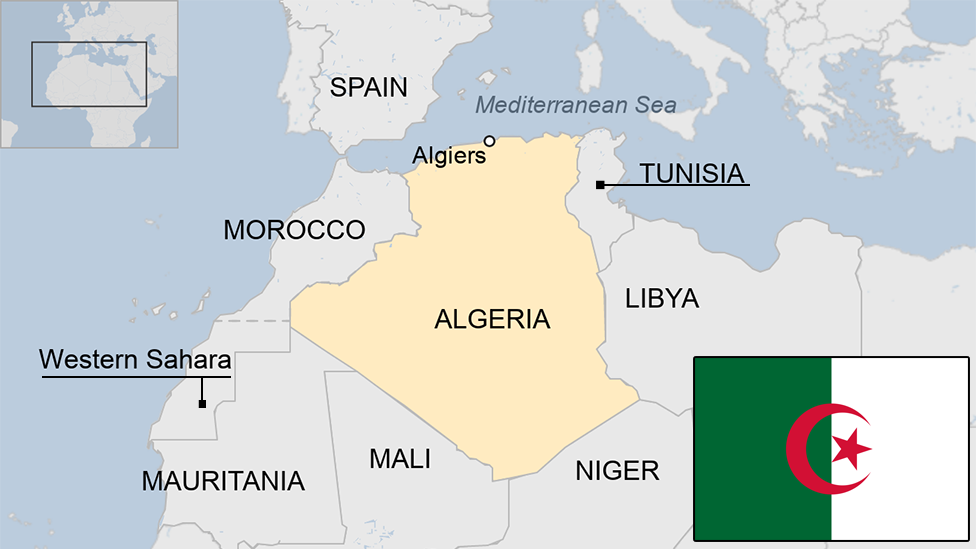Algeria's protests are back and the president is worried
- Published
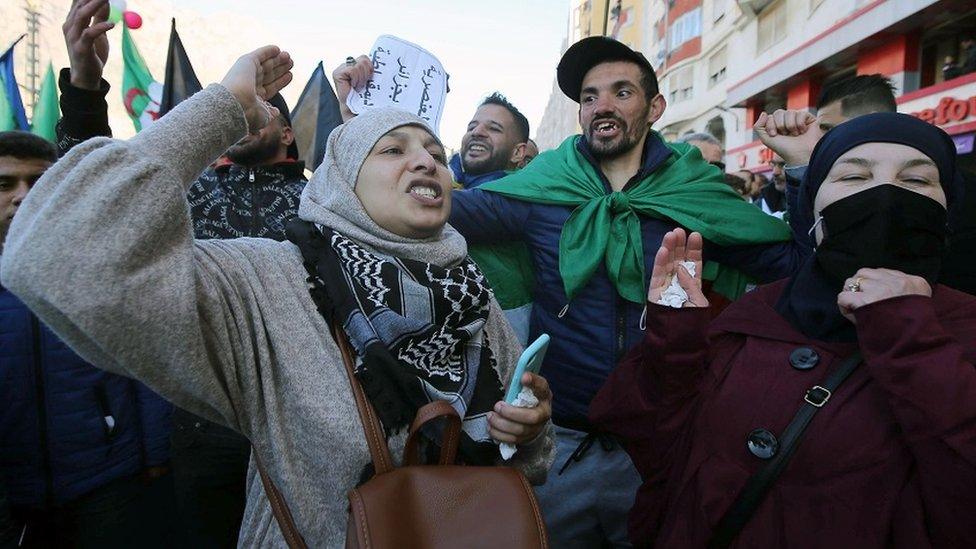
Thousands gathered in the town of Kherrata on Tuesday
Mass street protests are back in Algeria and the government is nervous.
Cries of "Algeria, free, democratic" have once again been heard as thousands from all walks of life thronged to Kherrata, a town 200km (120 miles) east of the capital, Algiers, on Tuesday.
When the anti-government movement, known as the Hirak, started almost exactly two years ago it brought down a president and paved the way for some high-profile corruption prosecutions.
Its weekly protests in Algiers attracted huge crowds and were an unprecedented show of popular opinion, considering protests had in effect been prohibited in the city since 2001.
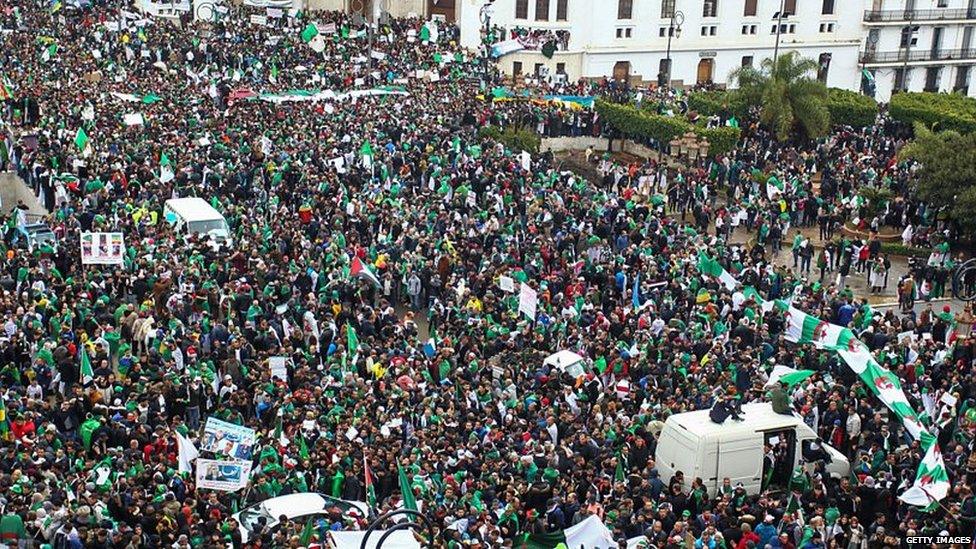
Weekly protests became a feature of life in Algiers from February 2019
The Hirak left the streets last year because of the coronavirus pandemic but it never really went away, and the Kherrata demonstration marked its first big protest since last March.
The authorities anticipate that the demonstrations that shook the nation from February 2019 will return to Algiers and for the last few weeks the capital has been on edge.
A palpable police presence hangs around the city centre. Transport vans, water cannons and armoured trucks have been camping out.
The peaceful protest movement, which does not have a centralised leadership, emerged in reaction to former President Abdelaziz Bouteflika's decision to campaign for a fifth consecutive term in office.
The ailing leader who had suffered a stroke in 2013, had not been seen in public since 2017 and many Algerians saw his candidacy as a humiliation.
He was the target of the protesters' anger along with his close inner circle, known as the "le pouvoir" or "the power".
There were jubilant scenes after President Bouteflika resigned in 2019
There is still frustration that some of those close to Mr Bouteflika continue to wield influence, hence the government's anxiety.
Prisoners freed
Following Tuesday's protest in Kherrata, President Abdelmadjid Tebboune began implementing appeasement measures.
Covid-19 restrictions and curfews were relaxed and no less than six political parties were invited to the presidential palace to discuss the current political climate.
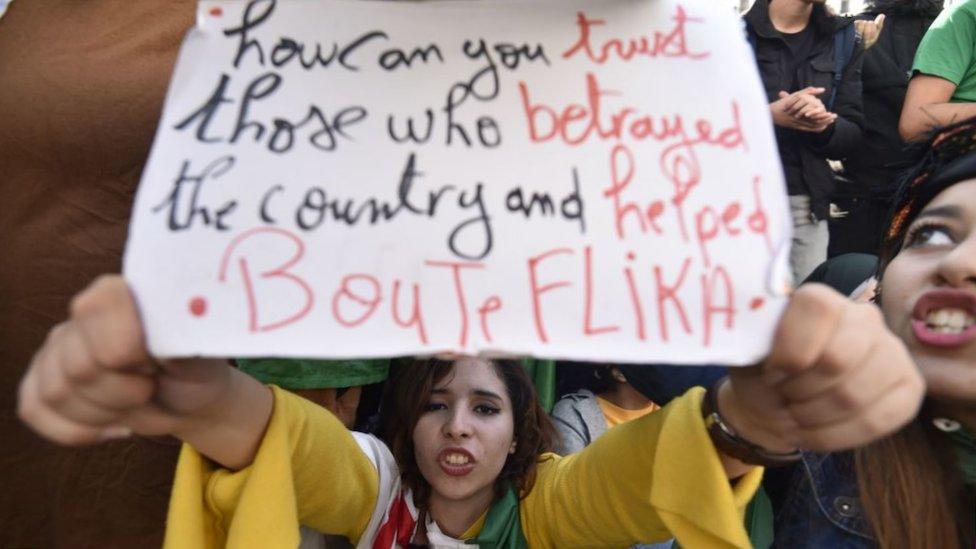
The anger was not just expressed against Mr Bouteflika but also those close to him
"We called on the president to take strong political measures that would restore the confidence of Algerians and establish real political will to bring about the desired change," the Socialist Forces Front, traditionally an opposition party in Algeria, said in a statement after meeting the president.
But the president, who was once Mr Bouteflika's prime minister, is viewed by many with suspicion. He did not satisfy the demand for change.
Other opposition parties, such as the Rally for Culture and Democracy (RCD), snubbed Mr Tebboune.
"This is not the time to debate whether or not to participate in the legislative elections, the fate of the country is at stake," Mahmoud Bougheriou, a prominent member of the RCD, told the BBC.
"Here, we are talking about mobilising and returning to the streets, because today the Algerian people cannot go forward with this regime that has been in place since our independence."
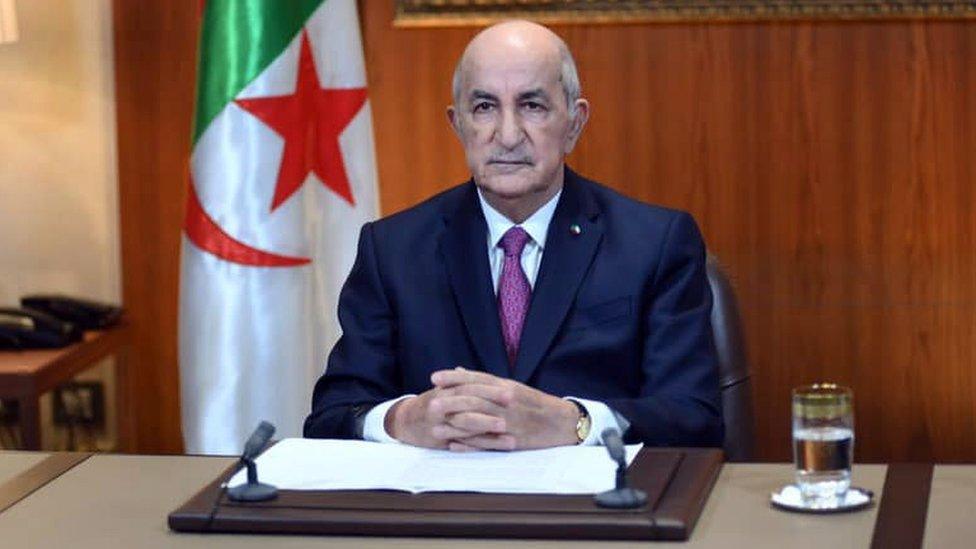
President Abdelmadjid Tebboune addressed the nation to try and appease the protesters
On Thursday, President Tebboune announced widely anticipated snap legislative elections and a cabinet reshuffle.
Most notably, however, he signed a presidential pardon for approximately 30 detainees from the Hirak who had been sentenced along with more than two dozen others who were waiting to go on trial.
"In total, between 55 and 60 people will go home to their families starting tonight or tomorrow," the president said in what was clearly an olive branch offered to the protesters.

More on Algeria's mass action:

They had been complaining that measures to contain the Covid-19 outbreak were being used to silence dissent in an echo of how the former government treated opposition.
Online action
A law banning fake news was passed last year, which activists believed was an excuse to crack down on free speech.
With lockdowns in effect, a number of collectives from the Hirak migrated online.
"People began discussing ideas on Zoom, Facebook Lives and other platforms," a member of one group, Algerian Detainees, who wanted to remain anonymous told the BBC.
"It kind of gave the movement the time and space to think, plan and organise itself."
As a result, dozens were arrested for making Facebook posts critical of the president and the military, while others were detained after participating in some small-scale protests.
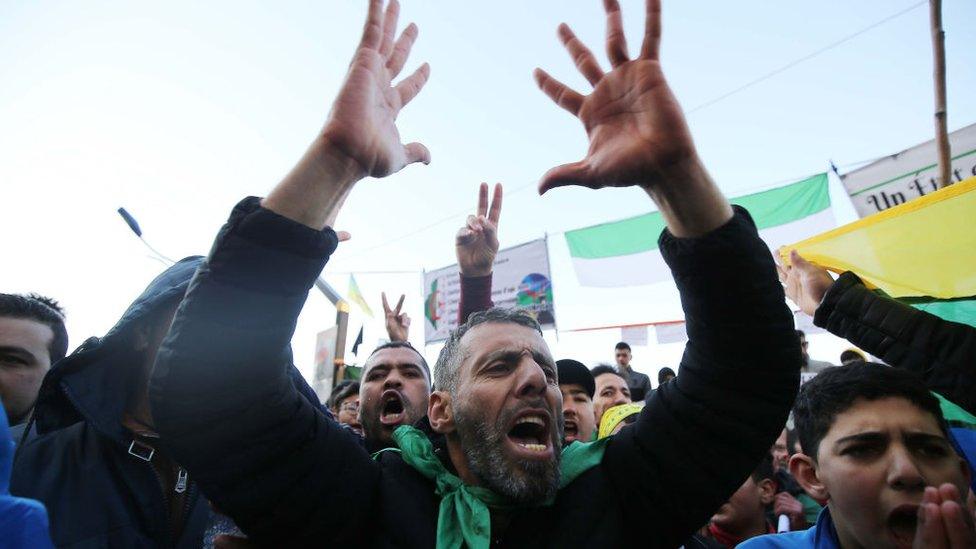
Some protesters complain that there has been no change under the new government
The apparent repression of free speech and the arrest of high-profile figures such as journalist Khaled Drareni, businessman Rachid Nekkaz - who were both among those released on Friday night - and former military general and presidential candidate, Ali Ghediri, increased public anger and apprehension at a regime that is considered illegitimate by many.
According to the Independent National Election Authority, 39% of registered voters turned out to cast their ballots in the 2019 presidential elections following a tense campaign that was criticised as not being sufficiently democratic.
Mr Tebboune, who was elected with 58% of the vote, was immediately rejected by the Hirak who regarded him as an extension of the old political system.
Furthermore, in a parallel to Mr Bouteflika's absence from public life, the 75-year-old president was in Germany for a total of three months last year for medical treatment without the nature of his illness being disclosed, which further fuelled distrust.
Calls for a protest in Algiers on Monday to mark the movement's second anniversary in the city have surfaced online.
It is not yet clear whether protesters will brave the stifling police presence and reject the government's attempted appeasement measures, or if the president will be given time to draw up yet another political roadmap for Algeria.
Related topics
- Published11 December 2019
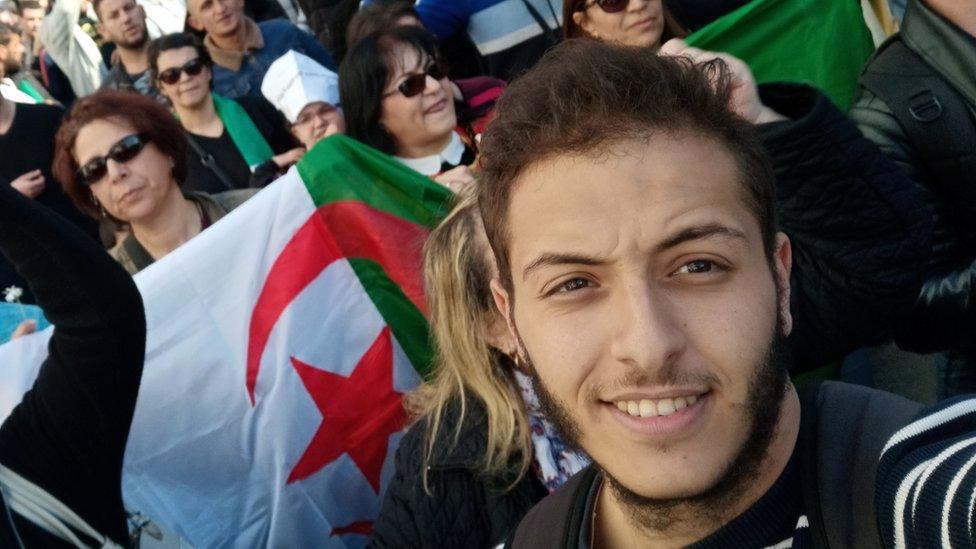
- Published1 November 2020
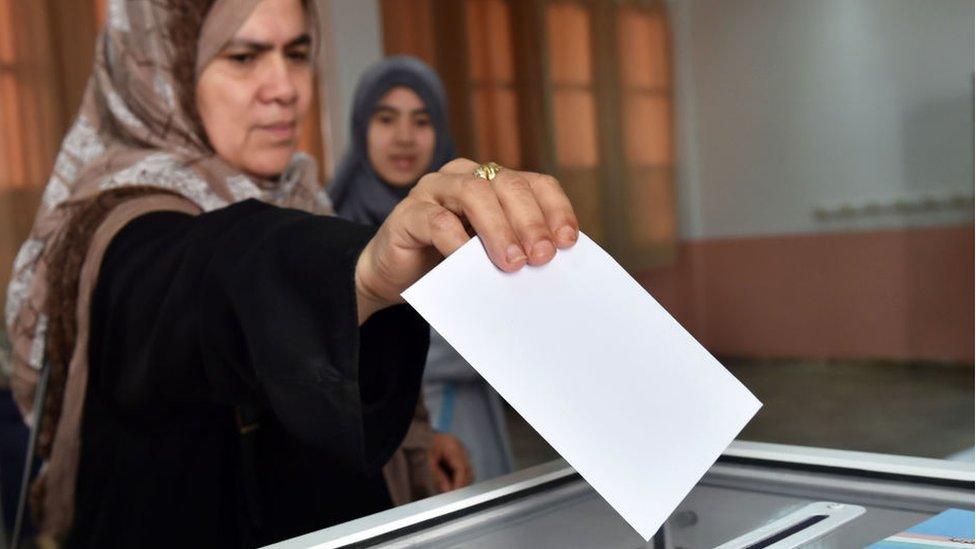
- Published21 February 2020
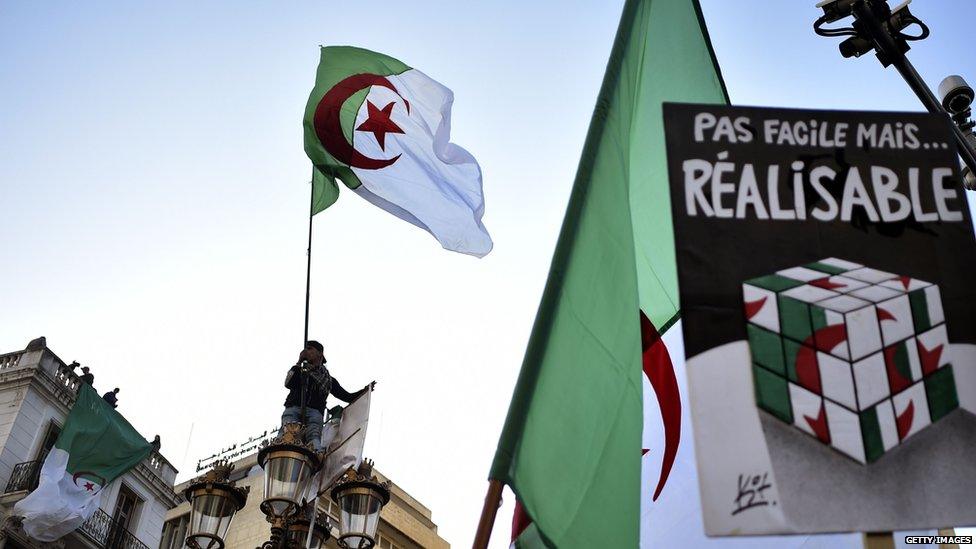
- Published30 August 2020
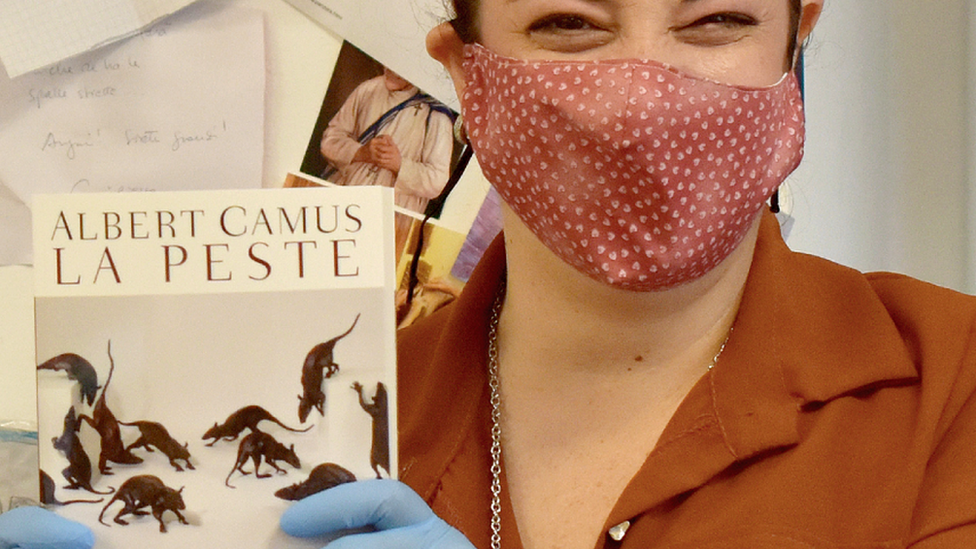
- Published9 September 2024
